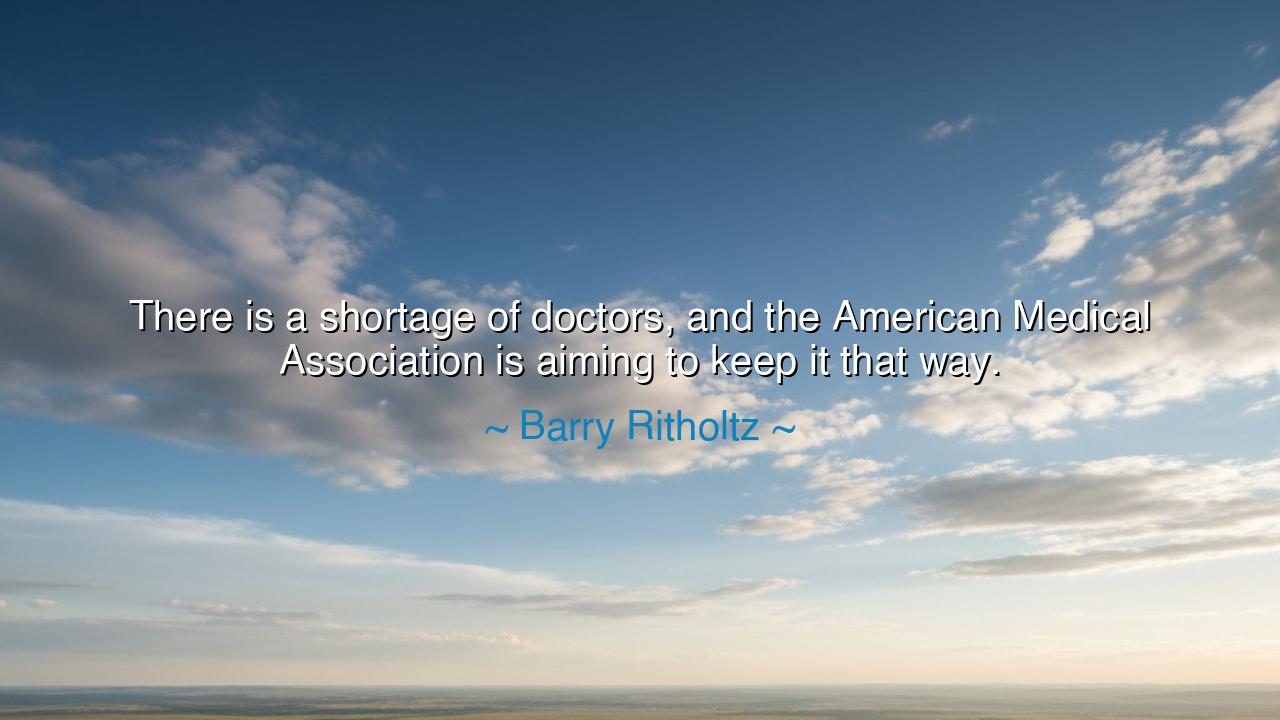
There is a shortage of doctors, and the American Medical
There is a shortage of doctors, and the American Medical Association is aiming to keep it that way.






In the words of Barry Ritholtz, "There is a shortage of doctors, and the American Medical Association is aiming to keep it that way." These words strike at the heart of a troubling reality: the medical profession, a field meant to heal and serve, often finds itself embroiled in the forces of power, privilege, and control. Ritholtz’s statement calls attention to a critical imbalance, where the needs of society clash with the institutional forces that guard the profession’s standards and access. At its core, his message challenges the system that restricts the flow of new doctors, suggesting that the shortage is not merely an accident, but a deliberate consequence of policies that prioritize the interests of established medical bodies over the needs of the people they are sworn to serve.
The ancients knew well that the tension between those in power and those who seek to serve the greater good is as old as civilization itself. In Plato’s Republic, the philosopher grapples with the question of governance and the role of elites in shaping society. He warns that when the elite classes, whether in politics or medicine, control access to the most essential services, they risk perpetuating inequality and injustice. In this context, Ritholtz’s words echo the age-old concern that when any profession or institution is controlled by a powerful few, those few will often act in their own self-interest, restricting access and maintaining a system that benefits them while denying the masses. The very purpose of the medical profession—to heal and serve—is obscured when medical associations protect their own power at the expense of the broader society.
Consider the story of Hippocrates, the father of medicine, whose commitment to healing was driven by a deep understanding of the responsibility that doctors had to their communities. Hippocrates emphasized the ethics of medicine, teaching that physicians should serve humanity without regard for personal gain or prestige. However, even in ancient Greece, there were tensions over the accessibility of medicine, with the wealthy often receiving better care than the common people. The idea that a profession designed to heal could be manipulated for financial or political power is not a modern issue but one with ancient roots. Ritholtz’s quote sheds light on how, over time, those with power—whether through professional organizations like the American Medical Association or political structures—can manipulate access to critical services like healthcare to preserve their own status.
Fast forward to the present day, and we see the stark reality of the doctor shortage in the United States. According to Ritholtz, the American Medical Association plays a crucial role in perpetuating this shortage by restricting access to medical training, limiting the number of medical students, and regulating who can enter the field. In essence, this organization’s actions serve not to expand healthcare access, but to protect the interests of those already within the profession. This creates a systemic barrier to entry, preventing new generations of qualified individuals from entering the field and exacerbating the gap between supply and demand for medical professionals.
This practice of controlling entry into the medical profession can be compared to the guilds of the medieval period, which often controlled access to trade and craft professions. Guilds, while originally established to maintain standards and quality, were frequently criticized for limiting competition and keeping the fruits of labor within a select group. Just as those guilds maintained control to preserve their own wealth and influence, the American Medical Association and other similar bodies may be seen as safeguarding their own interests by controlling the flow of new practitioners. In this way, the same ancient concerns about monopolies of power and control over vital services echo through history, showing us that economic forces often prioritize the powerful over the needs of the many.
The lesson we learn from this is a difficult one: the institutions we trust to serve the public good—whether they be in medicine, education, or government—can become self-serving. The shortage of doctors is not just a practical issue; it is a moral and ethical one, rooted in a system that favors the few over the many. This presents a challenge to all who care about justice and equity in society. As citizens, we must recognize that access to healthcare is not just a privilege for those with wealth or influence but a fundamental human right. As leaders in any field, we must question and challenge systems that perpetuate inequality and work towards dismantling them.
Let us, then, take action in our own lives. Whether in medicine, education, or any other sector, we must advocate for access, equity, and the breaking down of the barriers that keep the many from benefiting from the services that should be available to all. Just as the ancients taught us the importance of serving the common good, we must continue their work by demanding fair access to the essential services of life. Let us not be complicit in systems that prioritize power over people, but instead strive to create a world where the needs of the many are met by the work of the few. The fight for justice and access to healthcare is not just a modern struggle—it is a timeless one that requires action from all who believe in the equality of mankind.






AAdministratorAdministrator
Welcome, honored guests. Please leave a comment, we will respond soon